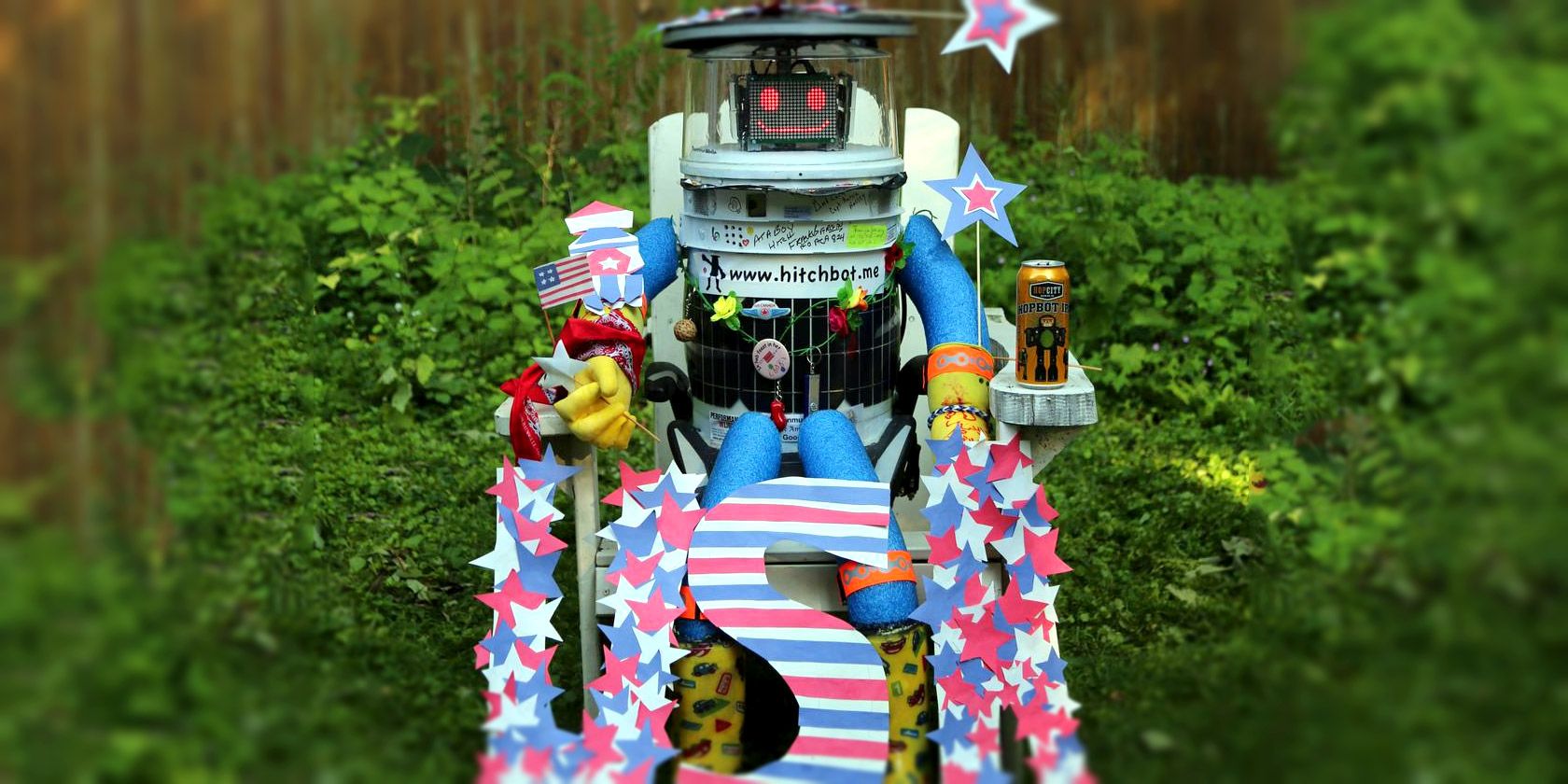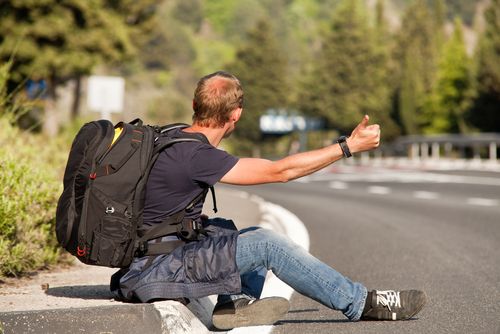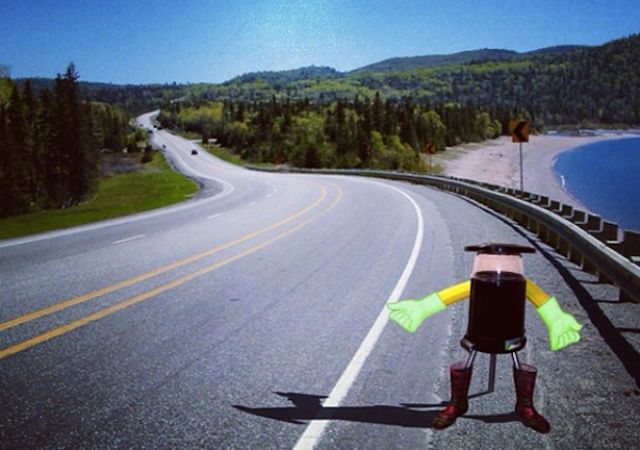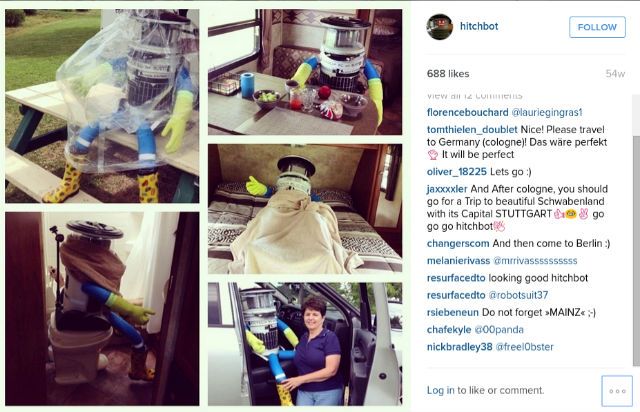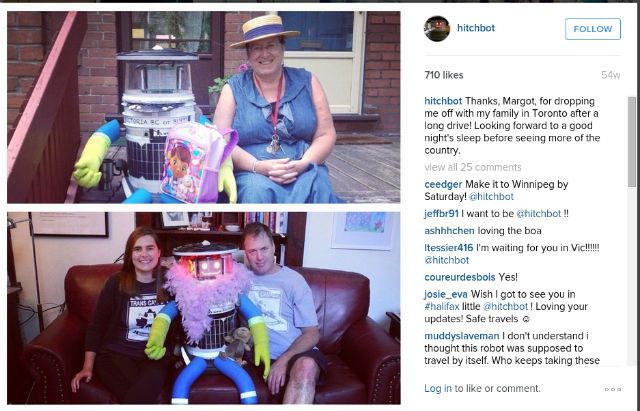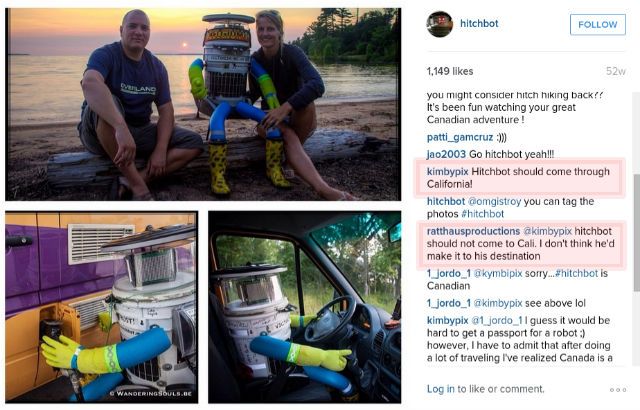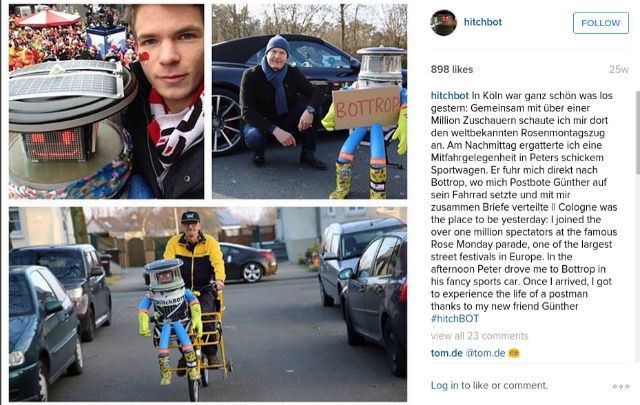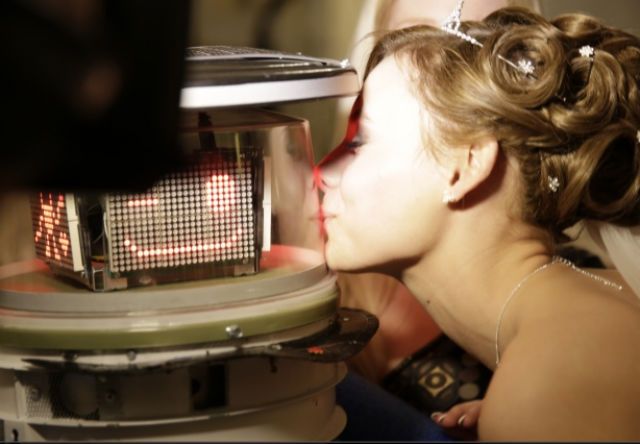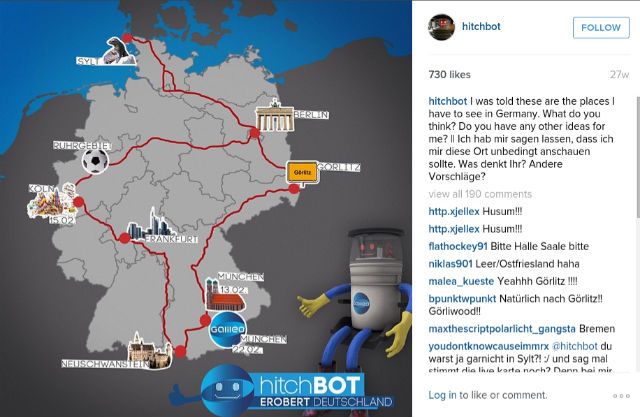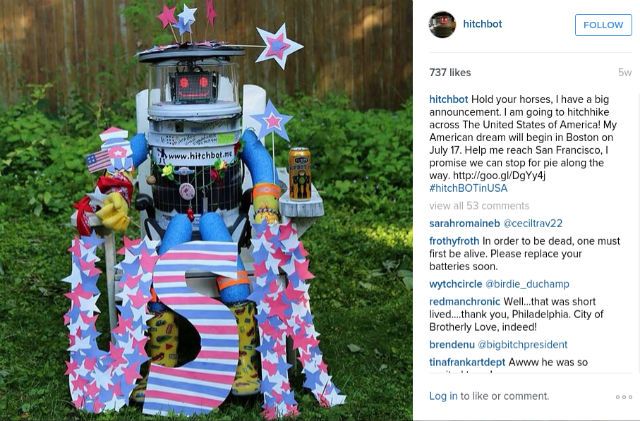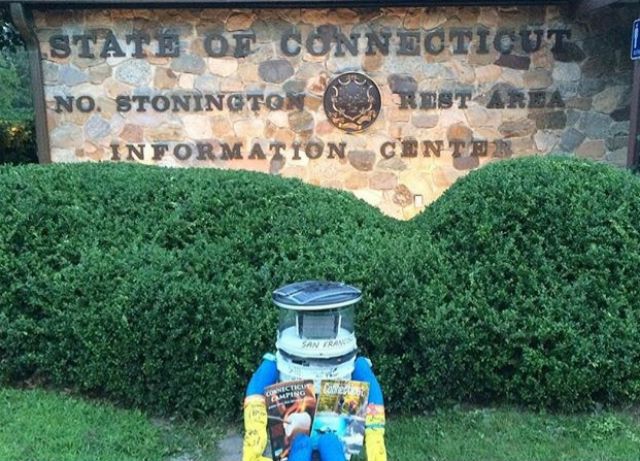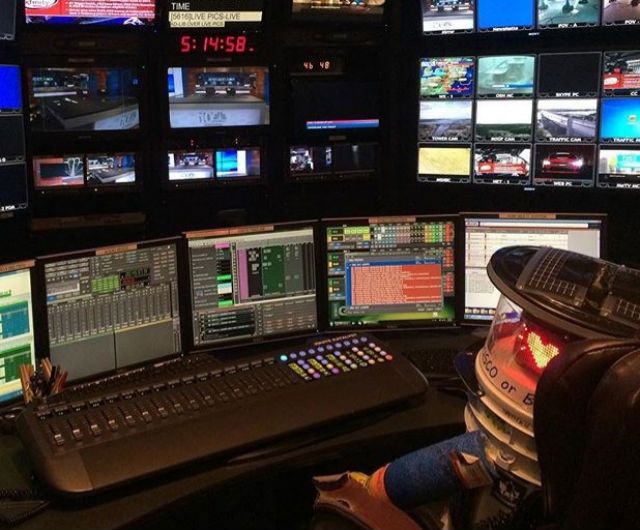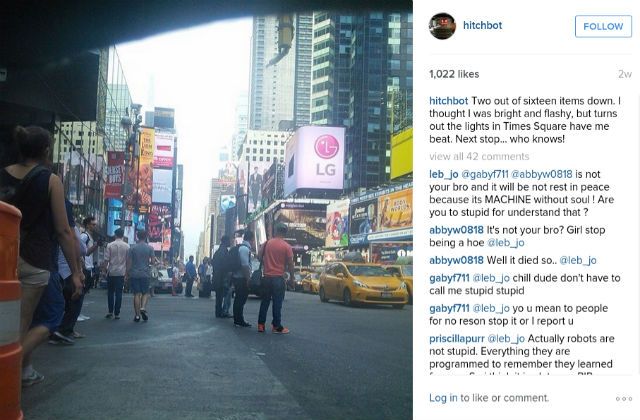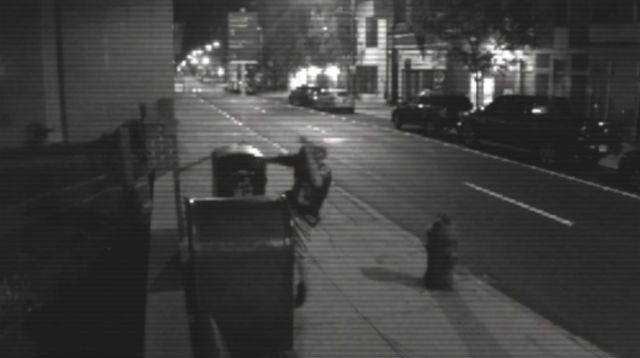In July of 2014, a little robot began a hitchhiking adventure that would take it across the beautiful Canadian landscape, throughout Germany by February of 2015, and back to Boston in July of the same year. As the little bot started it's American adventure, the poor thing made it no further than Philadelphia, where vandals destroyed it on August 1st.
The little smiling bot enjoyed an entire year being hosted by friendly travelers all across the Canadian and European countrysides. Yet, two weeks in America and the bot got destroyed. So, what does that say about the US?
This is Why We Can't Have Nice Things
To say that I'm disgusted is an understatement. Here is the latest video showing the culprit who crushed the little bot to bits.
Some random hoodlum on the streets of Philly. Am I surprised? Not really. Back in 2014, when our own Justin Pot wrote about hitchBot's cross-country trek, I commented privately to Justin that hitchBot wouldn't survive very long in the United States. hitchBot was barely in the U.S. for two weeks when he got the PVC kicked out of him.
[UPDATE] - Vlogger Jesse Wellens and Bassmaster admitted hoaxing the video above. No one knows who actually destroyed hitchBot, and no one has accepted responsibility even though Wellens was the last person to see or video the robot in one piece.
hitchBot's Fate Reveals Technology Fears
The fate of hitchBot, when viewed in the context of its purpose, reveals a great deal about humanity.
When Drs. Frauke Zeller (Ryerson University) and David Harris Smith (McMaster University), decided to build hitchBot, they designed it as a social experiment. This was stated on the very first press release at the hitchBot website.
Specifically, under "intentions and aspirations", the creators wrote (using the robot's own "voice"):
"I hope that my hitchhiking trip will allow me to meet many interesting people, see beautiful places, and learn more about humanity. I want to take my time and also meet a variety of people, so I hope those I meet will be generous and understanding. I think my trip will lead to conversations about how robots and humans can live in harmony, and I hope that humans and robots can learn to trust each other as a result of my journey."
What hitchBot learned about humanity was - at first - enlightening, uplifting, and wonderful. I will review some of what hitchbot learned about society in Canada and Germany. HitchBot's experience reveals a great deal of good things about those countries. Unfortunately, hitchBot's experience in the U.S. was quite a bit grimmer.
When a Robot Asks for a Ride
When I was a kid, my dad used to pick up strangers who were hitchhiking. When I asked him why he did something that most people consider to be very dangerous, he said something to me that I'll never forget. He said, "I was one of those kids long ago, hitchhiking back and forth from school. I remember how good it felt when someone stopped to help me out, and I always promised myself that I'd always be one of those people who will stop to help."
As the years went on and I got older and got my own license, I could never build up the kind of courage my father had to pick up a stranger and give him or her a ride. What it really comes down to is trusting strangers, and at least in my part of America, trusting strangers is something people do much less of these days.
Can robots have a little more ? Alas, this was the mission of this little robot as he set out on his journey across Canada.
What did hitchBot learn about how much it could trust the people of Canada? How long until it would get stolen and sold off for spare parts? It's hard enough these days for a person to travel the world relying solely on the kindness of strangers, but a PVC robot with a blinking LED smile? The odds were not good.
Robots Can Trust Canadians
As hitchBOT made its way on July 27th, 2014 from the Nova Scotia College of Art and Design, headed for Victoria, Dr. Frauke Zeller, one of the cofounders of the social experiment, told the press that hitchBOT's existence was primarily as a litmus test for the kindness of strangers toward technology.
"Usually, we are concerned whether we can trust robots ... but this project takes it the other way and asks: can robots trust human beings?"
My first thought when I heard about this experiment was a great, resounding "No!" in response to Dr. Zeller's question. However, Canadians were the first to prove me wrong.
It all started when Anne and Brian Saulnier, a couple heading to Kouchibouguac National Park, were thrilled to pull over to pick up the weird-looking gadget. They had heard about the project on the radio, so hitchBOT was lucky enough to start the journey with a pair of fans. But would everyone he met be a fan of technology seeking a ride?
Actually, yes. Everyone hitchBOT met in Canada treated the little guy like a celebrity. He was brought to Quebec and then Montreal. One friendly traveler even took hitchBOT on a camping trip to the Blue Heron campground in Charlo, NB.
Throughout its travels toward the Pacific Ocean, hitchBOT met one beautiful Canadian after another; all the way making countless friends and revealing to the world just how wonderful and friendly Canadians are, even when offered nothing in return.
As hitchBOT's Canadian adventure approached its end, everyone across social media were speculating about where the little robot should head to next. One prophetic exchange on Instagram expressed the same trepidation about hitchBOT's fate if its travels took it into the U.S.
User Kimbypix posted: "hitchbot should come through to California!"
To which ratthausproductions responded: "@kimbypix, hitchbot should not come to Cali. I don't think he'd make it to his destination."
Although hitchbot did take a little trip down to the Golden Gate Bridge, its next adventure wasn't an American one, but a German one instead.
Robots Can Trust Germans
Like Canadians, Germans proved that what they may lack in humor, they make up for in hospitality. hitchBOT was welcomed with open arms.
hitchBOT's journey across Germany brought this little robot face to face with wonderful people who did not shy away from interacting in a positive way with a technological entity. They didn't fear it, hate it or envy its gadgetry. They simply gave it it a ride, and maybe snapped a selfie or two with it as well.
In the 10 days hitchBOT traveled through Germany, it passed through cities like Munich, Cologne, Berlin and Hamburg. Given, much of its time in Germany was under the care (and some may say the protection) of the German edutainment show Galileo. However, outside of that protection, hitchBOT still safely traveled the German landscape on a bicycle, in a sports car, and even attending a wedding near Frankfurt. The bride even kissed hitchBOT!
Nowhere in Germany or the Netherlands did hitchBOT get hit, attacked, ripped off, mugged or even insulted. No, hitchBOT was treated like a guest in a foreign country, and was even welcomed to participate in the carnival Rose Monday Parade in Cologne.
As July of 2015 rolled around and news hit the street that hitchBot had finally landed on the East Coast of the United States, the world turned its gaze toward the United States. Canada, Germany and the Netherlands had answered that grand question, "Can Robots trust humans?" with a resounding yes.
Now, Americans needed to step up to the plate and prove to the world that America really is one of the greatest countries on Earth.
Robots Can NOT Trust Americans
Week one of hitchBOT's American journey started in Boston on July 17th. On this same day, the Storify stream was created to chronicle the U.S. adventure.
There were a few things in hitchBOT's favor from the start. Starting out in Boston, there was plenty going for the little robot - getting sent off from the Peabody Essex Museum meant that hitchBOT was likely to get picked up in a "good part of town", and not likely to run into any problems on its way out of the city. If the trip had started off in Mattapan....fuhgettaboutit.
I am actually underplaying the great time hitchBOT had traveling around Boston. Someone actually took the little guy to a Red Sox game (it was on the bucket list).
By July 24th, the little techno-traveler had actually made it halfway through Connecticut on its way to New York City.
It was about one week after starting the U.S. journey, and it was starting to look like cynical observers like myself would be proven wrong. Maybe hitchBOT was going to survive its U.S. journey after all...
By July 25th, they had hitchBOT sitting at the desk of NBC Studios before getting a full tour of NYC on the 26th!
The odds were looking better all the time that hitchBOT may actually survive its U.S. tour. Approaching two weeks, the little PVC gadget had just survived two of the cities most likely to cause it the most grief. Headed toward Philly, it's cross country tour looked promising. Then disaster struck.
The Demise of hitchBOT
Maybe hitchBOT's mistake was trusting YouTube vlogger Jesse Wellens for a ride into Philadelphia on the morning of August 1st.
Maybe its mistake was setting course through Philadelphia in the first place - the city of "brotherly love" hasn't been very loving in recent years. There are roughly 10% more shootings and murders this year than there were in 2015. With gang activity on the rise, the city just doesn't feel like a very nice place to be.
hitchBOT learned this lesson the hard way. While innocently waiting on a streetside bench at Elfreths Ally, an anonymous hoodlum walked by once, poked at hitchBOT a few times, and then stomped it to pieces for absolutely no reason.
The fact that hitchBOT could survive for so long in Canada and across Europe, in the company of such wonderful people, says volumes about the type of people who live in those countries and their relationship with technology. Likewise, the fact that hitchBOT couldn't survive for more than two weeks - and barely two hours on the streets of Philly - says volumes about the type of people who live in America and their relationship with technology.
What hitchBOT learned - and what every future robot should be aware of - is that no; robots can't trust humans on the streets of America. What does that mean for self-driving cars, drones, and the other autonomous robots who will soon be sharing our roads and homes? Nothing good, I'm afraid.
Do you think there should be another hitchBOT experiment in the near future? If so, should they keep it out of the United States if possible? Share your own thoughts in the comments section below!
Soloviova Liudmyla via Shutterstock, hitchbot Images courtesy of hitchbot.me

